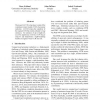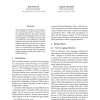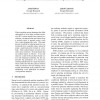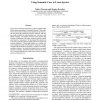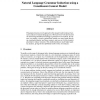119
Voted
ACL
2012
13 years 4 months ago
2012
We present LLCCM, a log-linear variant of the constituent context model (CCM) of grammar induction. LLCCM retains the simplicity of the original CCM but extends robustly to long s...
113
click to vote
ACL
2012
13 years 4 months ago
2012
We investigate the potential of Tree Substitution Grammars as a source of features for native language detection, the task of inferring an author’s native language from text in ...
135
click to vote
EMNLP
2011
14 years 1 months ago
2011
We show that categories induced by unsupervised word clustering can surpass the performance of gold part-of-speech tags in dependency grammar induction. Unlike classic clustering ...
132
click to vote
EMNLP
2011
14 years 1 months ago
2011
We present new training methods that aim to mitigate local optima and slow convergence in unsupervised training by using additional imperfect objectives. In its simplest form, lat...
148
click to vote
EMNLP
2011
14 years 1 months ago
2011
When translating among languages that differ substantially in word order, machine translation (MT) systems benefit from syntactic preordering—an approach that uses features fro...
137
click to vote
AAAI
2011
14 years 2 months ago
2011
We present a method for dependency grammar induction that utilizes sparse annotations of semantic relations. This induction set-up is attractive because such annotations provide u...
140
click to vote
JMLR
2010
14 years 8 months ago
2010
Inducing a grammar from text has proven to be a notoriously challenging learning task despite decades of research. The primary reason for its difficulty is that in order to induce...
113
click to vote
CSL
2006
Springer
15 years 2 months ago
2006
Springer
Grammar induction, also known as grammar inference, is one of the most important research areas in the domain of natural language processing. Availability of large corpora has enc...
143
click to vote
NIPS
2001
15 years 3 months ago
2001
This paper presents a novel approach to the unsupervised learning of syntactic analyses of natural language text. Most previous work has focused on maximizing likelihood according...
ACL
2006
15 years 3 months ago
2006
We first show how a structural locality bias can improve the accuracy of state-of-the-art dependency grammar induction models trained by EM from unannotated examples (Klein and Ma...
